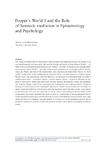Popper's world 3 and the role of semiotic mediation in Epistemology and Psychology

View/
Use this link to cite
http://hdl.handle.net/2183/13371Collections
Metadata
Show full item recordTitle
Popper's world 3 and the role of semiotic mediation in Epistemology and PsychologyAuthor(s)
Date
2012Citation
Culture of communication / Communication of culture, 2012: 1177-1183. ISBN: 978-84-9749-522-6
Abstract
[Abstract] The Theory of Worlds is one of the best known parts of Popper’s philosophical heritage. According to it we can methodologically (not necessarily ontologically, though) split reality in three domains: World 1 – the realm of the physical and biological beings as such; World 2 – the realm of consciousness, thoughts and all other subjective states; World 3 – the realm of the objectived products of the thought: symbols, theories, values, etc. Popper, and most of his commentators, when discussing the relationship between the “three worlds” usually stress on the mediational role played by World 2 (consciousness) as a medium through Worlds 1 and 3 can communicate with each other (e.g., the mediation of a determined mind, or minds, is needed to some ideas — as vehicles projects — become material objects — as cars). In this paper we will stress in other kind of relation and mediational processes between the popperian worlds: the mediational role played by Worlds 1 and 3 in the communication established by two minds (two distinct Worlds 2). Although this idea has never been highlighted explicitly by himself, his claims about the intersubjective nature of scientific objectivity and his ideas about the regulatory action that some shared values (moral, or epistemic) can exert over the human psyche will be used as hints pointing to the plausibility of this interpretation. The results presented here intent to point to a clarification of the psychological roots of Popper epistemological thought, and shed some light over the understanding of actual scientific knowledge production activity in Popperian grounds, helping to, at least, blur the so propagated opinion that his theoretical constructs are just able to deal with idealized normative prescriptions or standards of scientific inquiry.
ISBN
978-84-9749-522-6





